A publication produced on the anniversary of the Polish Revolution (November Uprising; 1830-1831). Reproduced from the collection held by Kujawsko-Pomorska Digital Library.
A translation of Daniel O’Connell’s speech given at the meeting to celebrate the anniversary of the Polish Revolution.

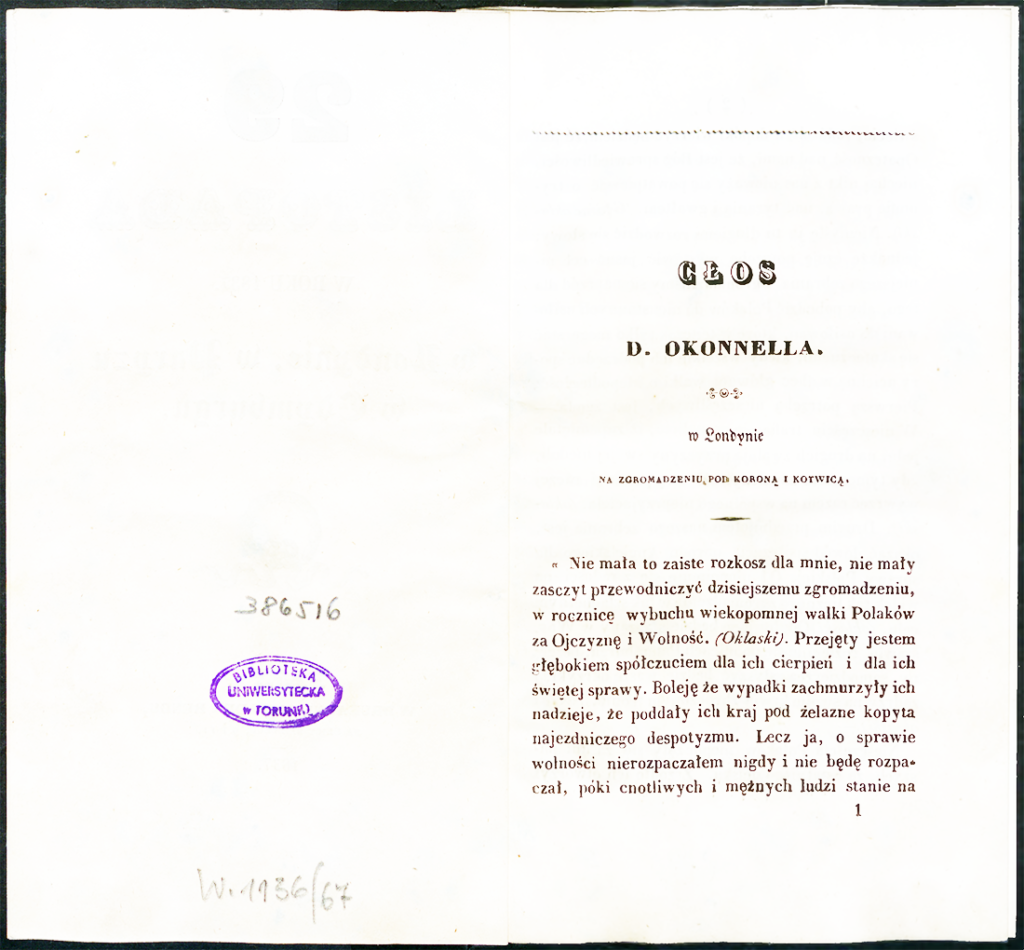
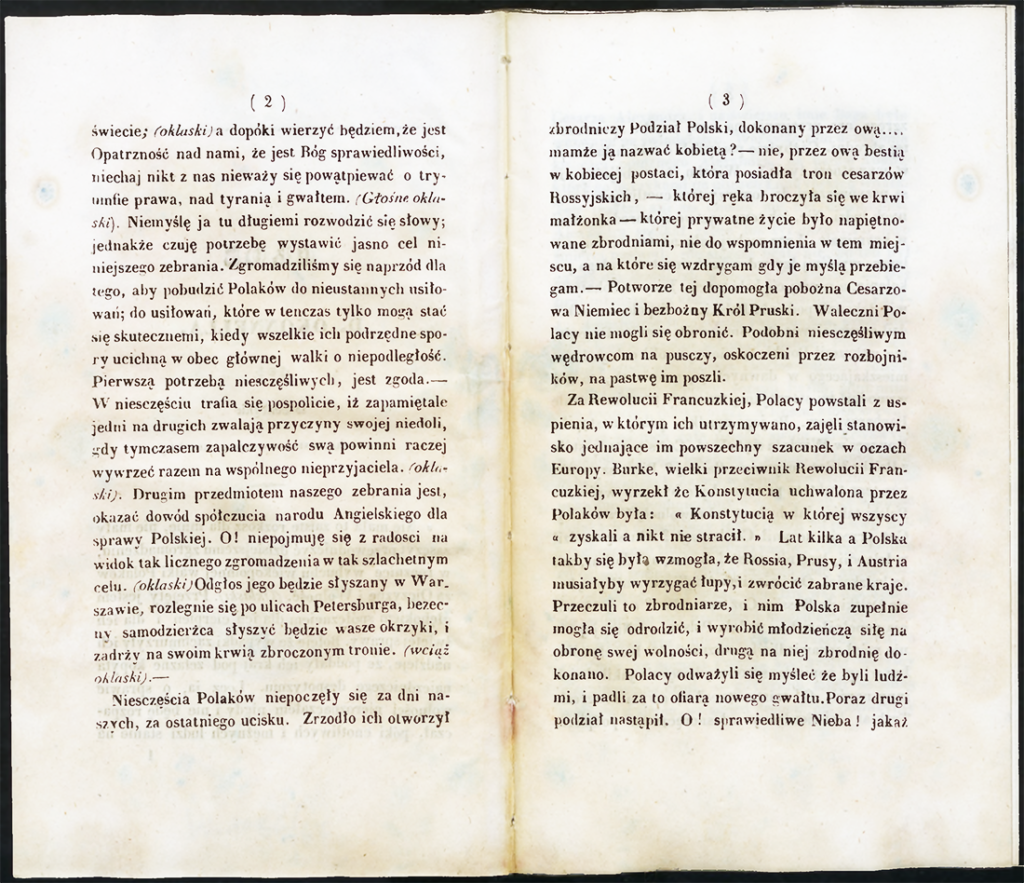
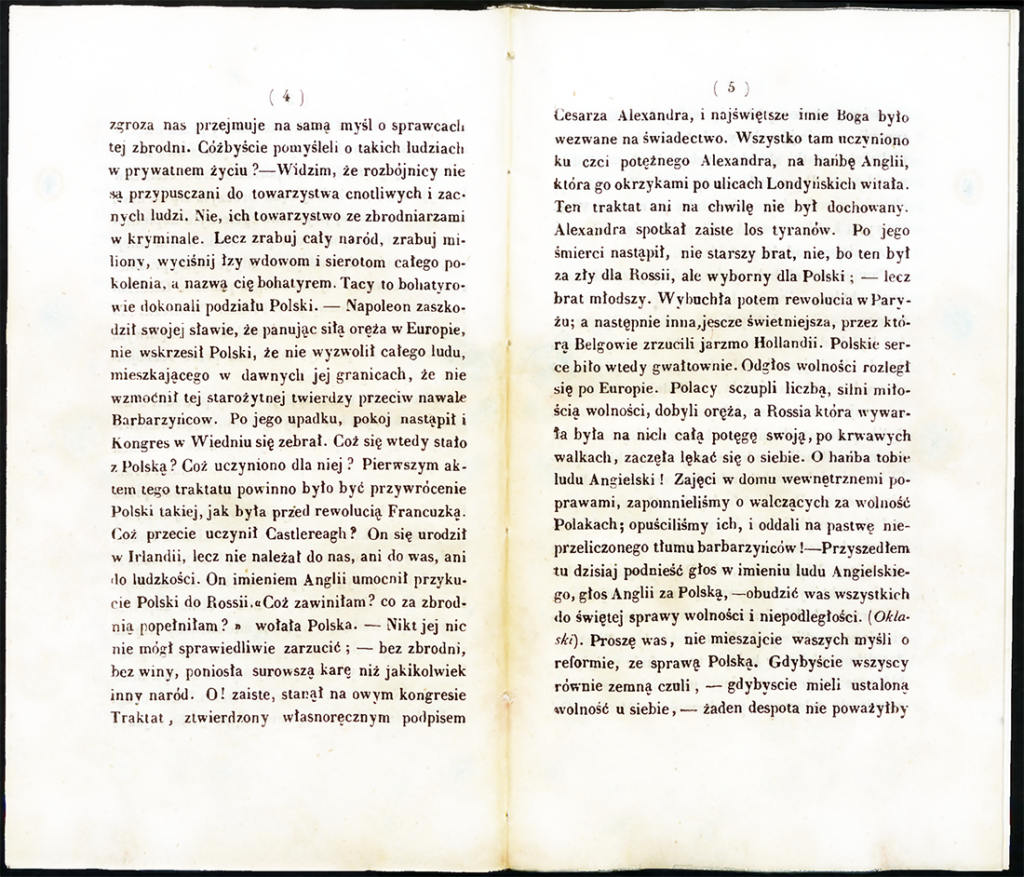
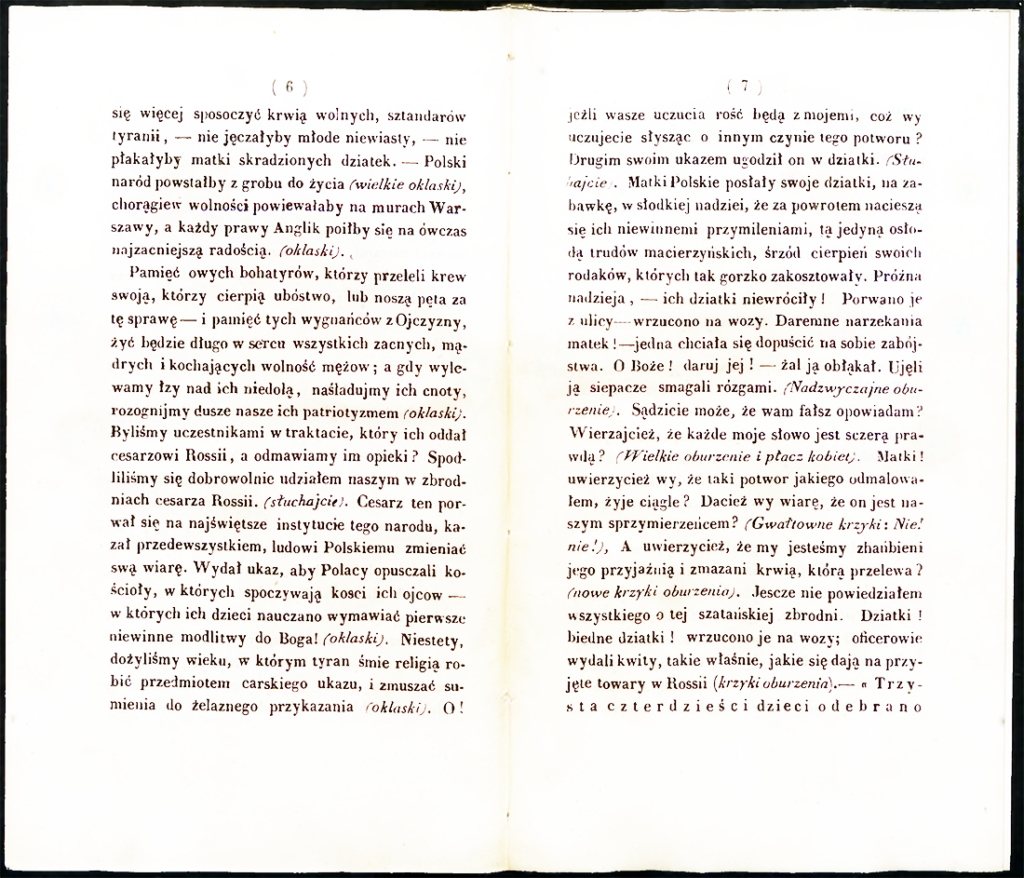
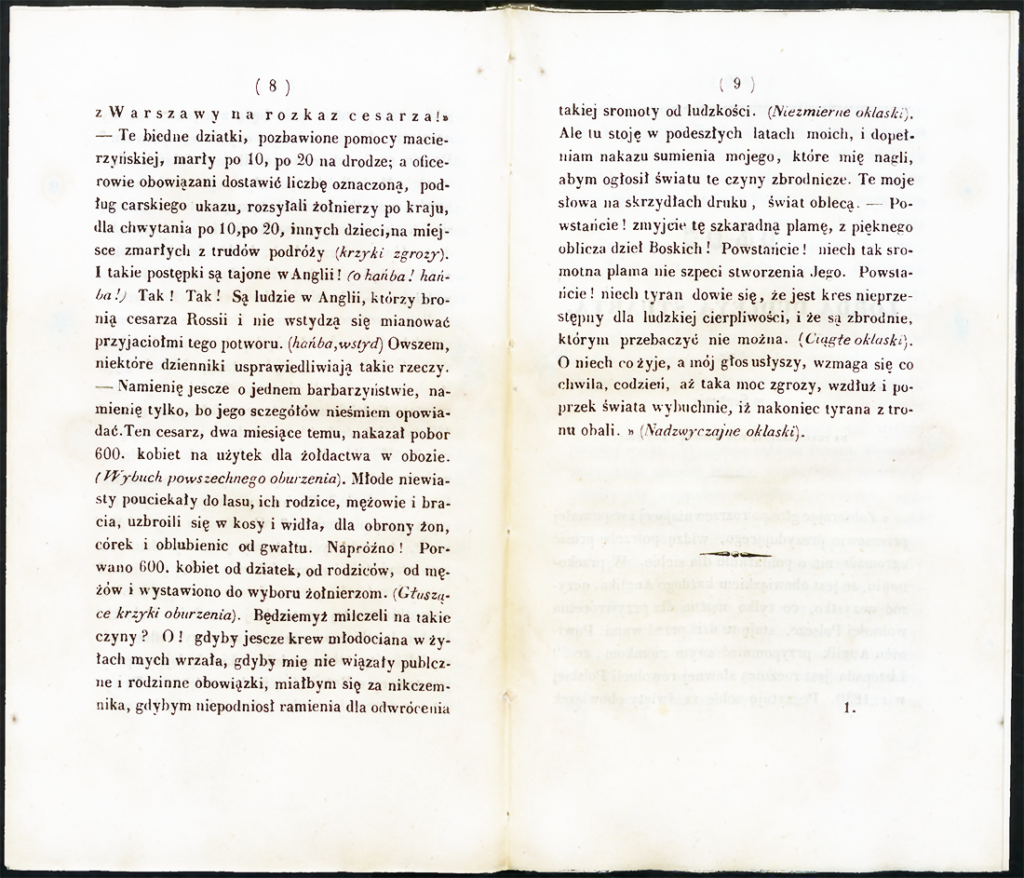
Excerpt from the Irish newspaper Freeman’s Journal of December 2, 1837.
Daniel O’Connell’s speech given at the meeting to celebrate the anniversary of the Polish Revolution (fragments marked in blue are not included in the Polish translation of O’Connell’s speech).
„It is, indeed, no small honour and gratification to me to be permitted to preside upon such an occasion as the present – the anniversary of the glorious struggle with the gallant Poles for their native country and for liberty (cheers). I feel a deep sympathy in their sufferings – in their holy cause. I feel regret for the events that have clouded their prospects, placed their country under the iron hoofs of foreign despotism, and seems to obscure any view of the restoration of that country (cheers). But I have never despaired of liberty (loud cheers) – and I will never despair of liberty so long as there are honest and brave men in the world (cheers). So long as we recognise the providence of the God of justice, we should never dare to despair of the progress of right and the downfall of oppression and injustice (loud cheers). It is not of course my intention to trespass at any length on the meeting, but with your permission I cannot avoid giving a brief outline of the object of this meeting. The first is to animate the Poles to continue exertion – to induce them to avoid all dissensions among themselves, to unite in the great cause of their country – laying aside all these minor details which may involve them in heats and animosities, and which ought to be reserved for that period when their country, being restored, they can legitimately discuss provisions for their future government (cheers).
Union is most necessary among them, for it unfortunately happens that when men fall into misfortune, they are too apt to blame one another as the cause. All anger and irritation ought to be directed against the common enemy, and not expanded upon the victims of the common cause (cheers). The next object is to give them a proof of British sympathy in the cause in which the[y] are engaged. Oh! I delight to behold this assembly so crowded in so noble a cause (loud cheers). It will be heard at Warsaw – it will resound through the streets of Petersburg – the miscreant autocrat will hear the shout (loud cheers) – and even on his blood-stained throne he will tremble at it (continued cheering). I am extremely glad that the Poles place not their cause upon the modern oppression of their country (hear) – upon the spoliation committed in 1830[1] – their complaint goes much further back in history. So far back as 1772, when the first partition of Poland took place[2] – that – shall I call her woman[3] – no – that beast in female form who filled the throne of Russia – whose hand was reeking with the blood of her husband – whose private life was contaminated by crimes not to be mentioned in this presence, and at which I shudder even as they pass through my thoughts – that monster with the aid of the pious Emperor[4] of Germany and King of Prussia, commenced the first partition. The gallant Poles were not able to defend themselves. Like unfortunate travellers in a desert country, unarmed and defenceless, they were attacked by banditti, and became an easy prey. Poland fell unstained, “without a crime,” for no other reason than that these robbers upon a more extended scale were the strongest (loud cheers) – and afterwards the example was imitated. The French revolution diffused itself over almost every territory (cheers) – but before that revolution spread far and wide the sacred name of freedom (loud cheers) – and gave a young hope of a more fortunate termination of the struggle, the Poles began to rise[5]. They raised the cry of liberty – they formed a constitution – they formed a free constitution for the remaining portion of their territory, which was respected by all Europe and emphatically praised by the eloquent Mr. Burke[6], the opponent of the French revolution. It was a constitution by which every one gained, and nobody lost. Blessed be Heaven, it conferred benefits upon all without injuring any one.
A very few years would have consolidated what remained of Polish strength – would have given a confidence to the Polish people which nothing could have withstood, and would have compelled the despot[7] to disgorge his plunder, and make restitution to this much-injured people. This was foreseen by Russia[8], and before Poland had time to amalgamate herself into a nation, to concentrate her young strength, another crime was committed upon them. They[9] dared to set themselves free[10], and to proclaim the constitution. Another partition took place, three more slices were taken off, and, sacred Heaven![11] do we not shudder when we consider the conduct of those who were parties to that compact?[12] What do we think of the conduct of such men in private life? Are plunderers admitted into the society of honest and honourable men? No; they are admitted only into the society of Newgate felons[13] (hear, hear). Plunder, however, a whole nation – rob by myriads – let the widow and the orphan weep for your atrocities – and you will then be called a hero. Such was the second spoliation[14]. Napoleon next spread his victorious arms over the Continent, and it is to be regretted that he did not then proclaim the freedom of the slave and serf, and set up Poland as a barrier against the incursions of the barbarian[15]. He was then a glorious instance of the success of the democratic principle, and he fell when he threw himself into the arms of the aristocracy. The peace next came, and the congress of Vienna met. What was then to become of Poland? What was to be done with her? The first stipulation of that treaty ought to have been to place Poland in the same situation as that in which she stood before the French revolution. What, however, did Castlereagh do? He was born in Ireland, but he did not belong to us, or to you, or to humanity (cheers). He bound the name of England to the transfer of Poland to the Emperor of Russia. What am I guilty of? said Poland – what crime have I committed? None. Without crime, and without guilt, she was punished in the severest way that a nation could be treated. Oh! there was a treaty, to be sure, which was ratified by the signature of the Emperor Alexander himself, and the sacred name of God was invoked on the ceremonies that were gone through on that occasion. Every thing was left to the honour of the mighty Alexander to the shame of the people of England[16], who shouted the despot through their streets. That treaty was not observed a single moment (hear, hear). He, to be sure, met with the fate of most tyrants – he reaped the just reward of his crimes; for tyranny will ever re-act on itself. He died one day (laughter) – and was succeeded, not by his eldest son – no, he was a little too bad for Russia, though good enough for Poland – but by his brother. The revolution in Paris then took place, when Charles X attempted to establish a despotism as complete as that of Russia. I am not one that am much in love, I confess, with his successor, but it was a glorious event[17]. Then came the still more glorious and valuable revolution by which the Belgians shook off the power of Holland. The Polish heart bounded high (hear) – the tocsin of liberty was heard to resound all over the Continent , and they fondly looked forward to the restoration of their own rights. Few in number, but strong in the love of liberty – and, after all, the arm of one lover of liberty is worth a hundred of the despot – they struck for liberty. The forces of Russia were brought against them, and for one year they withstood all her power[18].
Oh, disgrace to the people of England! they allowed them to be overpowered by the multitudinous forces of the barbarians; for, engaged as we then were, in the struggle for reform, we forgot that they were in need for our assistance[19]. It was to raise the voice of the country[20] – the voice of England – in favour of the Poles; it was to animate all in brotherly combat for freedom and liberty[21] that he appeared there that day (cheers). He called upon them not to allow their feelings for reforms to interfere between it and all their endeavours in favour of democratic freedom[22] (loud cheers). If all felt as he felt upon that subject – if their liberty was properly established at home, with constitutional guards which would make every man’s property secure, his life more safe (cheers) – if such were happily the case, then no more durst the despots of the Continent stain the flag of tyranny with blood – no more would the young women need to scream – the mother to weep for her stolen children (cheers) – the Polish nation would arouse and throw off that lethargy into which he had fallen (laud cheers)[23].
The banners of liberty would float over the tower of Warsaw, and then would every good man in England rejoice (loud cheers). The memory of the heroes who bled and suffered in that cause, and the memory of the exiles who were driven from their country shall long live in the recollection of all good wise, and patriotic men; and while we shed tears for their misfortunes, let our hearts glow at the same time with a spirit of imitation of their patriotism (cheers).
We were parties to the treaty which handed them over to Russia[24]; and yet we refuse to protect them (hear, hear). We submitted to the degradation of being made parties to the crimes of the Emperor of Russia (hear, hear, hear). What was the first institution which he violated? Why, the most sacred of all – their religion (here, here). The first thing he did was to order that the people of Poland should change their religion (hear, hear). He issued a ukase ordering them to quit the churches, in which lay the bones of their forefathers, and in which their children had first learned to lisp their innocent prayers to God (cheers)[25]. Yes, we have the degradation to live in an age when a tyrant dares to make religion the subject of an imperial ukase, and to force the consciences of men to submit to his iron rule (cheers). Oh, if you go with me so strongly on this point, what will be your sympathy when you hear the next act of this monster? The next thing he did was to order a proscription of children (hear, hear, hear). When the mothers of Warsaw let their children out into the streets to play, and expected at the evening to be again comforted with their presence and their smiles, amidst all the suffering of their country, in which they so bitterly participated (cheers) – but they never returned! They were seized in the streets – they were thrown into carts – the mothers screamed in vain; and one mother attempted to commit suicide – Oh, God, forgive her! She ought not to fly in the face of her Creator, but her misery overcame her – (as we understood the hon. gentleman). Well, she was seized, and for this crime she was scourged with the lash (indescribable sensation). Will you not think that I am telling you falsehood? Will you believe that every word I have said is literally true (great indignation)? Mothers of England[26] will you believe that such a monster as I have described to you is still alive (great cheering)? And will you believe that he is our ally (vehement cries of no)? Will you believe that we are dis[g]raced with his friendship, and stained with the blood which he sheds (shouts of indignation)? I have not told you the whole of this atrocious outrage. The children were thrown into carts; the officers gave receipts for them, just as for so much goods to be delivered in some part of Russia (cries of indignation). “Three hundred and forty children, received to the emperor’s order in Warsaw” (great sensation). But those poor children, being deprived of all maternal care, died by tens upon the road; and the officers, being obliged to account for the complete number ordered by the ukase, sent out detachments through the country and seized ten children to make up for every ten that died under the hardships of the road (indignant cheers). And things are palliated in England (shame, shame)! Yes, there are men in England who defend the Emperor of Russia, and are not ashamed to stand forward as the partisans[27] of that monster (loud cries of shame, shame). Nay, in some of the newspapers this conduct is justified. But let us now look to the Lemberg Gazette [Gazeta Lwowska] of the 10th of September last. What do we find there? Why, that a conscription[28] is ordered of 600 young women for the use of the army (a burst of indignation from all parts of the room)! The young women fled to the mountains[29] – their fathers, husbands, and brothers attempted to defend them – they armed themselves with scythes and forks, to rescue their wives and daughters and brides from the soldiers of the emperor, but it was in vain. Six hundred young women were torn from their children, their parents, and their husbands, and were exposed to the soldiers for selection (great indignation). Oh! can we be silent under these things? Oh! if the young blood flowed in my veins, or if I were not bound by ties at home, I would feel myself degraded if I did not raise my arm to prevent such outrages on humanity (vehement cheers). But I am here in my elder days, but I am not shrinking from that duty. I am here to say to the world – for what I say will be carried to the world on the wings of the press – Arise! and blot out this vile stain from the face of the creation! Arise! You are created in the image of God, and let not such an atrocious blot disfigure his works (cheers). Arise, and let the tyrant of the earth know that there is a limit beyond which human forbearance cannot go, and that there are crimes too atrocious for human pardon (cheers). Let every one who hears me spread this feeling of indignation around him, and let us raise such a cry of horror from all parts of the earth as will blast the tyrant on his throne.”
Daniel O’Connell’s speech given on 29 November 1837
[1] In the Polish translation: “za ostatniego ucisku” [“during the last suppression”] instead of “1830”, p. 2.
[2] This passage had been amended: “Zrzodło ich otworzył zbrodniczy Podział Polski” [“Their source was the flagitious Division of Poland”], pp. 2-3.
[3] Tsarina, Catherina II (1729-1796).
[4] Emperor Joseph II (1741-1790), successor of Empress Maria Theresa from 1780. In the Polish translation: “pobożna Cesarzowa” [“the pious Empress”], p. 3.
[5] According to O’Connell, it was primarily the constitution established by the Poles that gave them respect “by all Europe”. In the Polish translation of the speech, it was supposed to be the attitude of Poles, p. 3.
[6] Edmund Burke (1729-1797).
[7] In the Polish translation: “Rossia, Prusy, i Austria” [“Russia, Prussia, and Austria”] instead of “despot”, p. 3.
[8] In the Polish version: “Przeczuli to zbrodniarze” [“The felons sensed it”] instead of “Russia”, p. 3.
[9] In the Polish translation: ”Polacy” [”Poles”], p. 3.
[10] In the Polish version: ”odważyli się myśleć że byli ludźmi” [”They dared to think they were human”], p. 3.
[11] This passage had not been fully understood and translated, p. 3.
[12] In the Polish version, there is an affirmative sentence here: “jakaż zgroza nas przejmuje na samą myśl o sprawach tej zbrodni” [“What horror we are filled with at the very thought of the cases of this crime”], pp. 3-4.
[13] Newgate Prison, London; In the Polish version: “towarzystwo ze zbrodniarzami w kryminale” [“association with criminals in crime”], p. 4.
[14] In the Polish translation: “Tacy to bohaterowie dokonali podziału Polski” [“Such heroes divided Poland”], p. 4.
[15] This passage had been changed: “Napoleon zaszkodził swojej sławie … nie wskrzesił Polski, że nie wyzwolił całego ludu, mieszkającego w dawnych jej granicach, że nie wzmocnił tej starożytnej twierdzy przeciw nawale Barbarzyńców” [“Napoleon harmed his fame … he did not resurrect Poland, he had not liberated the whole people who dwelt within its former borders, he had not strengthened this ancient stronghold against the onslaught of the Barbarians”], p. 4.
[16] In the Polish version: “na hańbę Anglii” [“to the disgrace of England”], p. 5.
[17] This passage had to be removed for censorship reasons, p. 5.
[18] In the Polish translation: Russia “po krwawych walkach, zaczęła lękać się o siebie” [“after bloody fighting, began to fear for itself”] , p. 5.
[19] In the Polish version: “zapomnieliśmy o walczących za wolność Polakach” [“we have forgotten about Poles fighting for freedom”], p. 5.
[20] In the Polish translation: “Przyszedłem tu dzisiaj podnieść głos…” [“I have come here today to raise my voice […]”, p. 5.
[21] In the Polish version: “obudzić was wszystkich do świętej sprawy wolności i niepodległości” [“to animate you all to the sacred cause of freedom and independence”], p. 5.
[22] In the Polish version: ”nie mieszajcie waszych myśli o reformie, ze sprawą Polską” [”do not confuse your thoughts about reform with the Polish cause”], p. 5.
[23] The selected fragment has been significantly changed in the Polish version of the speech.
[24] In the Polish version: ”Emperor of Russia”, p. 6.
[25] It is important to emphasise that before the partitions of Poland, the Roman Catholic Church had a privileged position in the state, which was expressed in the Constitution of 3 May. After the partitions, there was a major change. However, it did not apply equally to Catholic Austria – there the Catholic Church was subjected to state control. The Catholic religion was treated differently in the other two partitions, where in Orthodox Russia and Protestant Prussia it was just tolerated. After the November Uprising (1830-1831) – and despite the encyclic Cum primum of 1832, issued by Pope Gregory XVI, which condemned the uprising – the tsarist authorities decided on repressions: many religious orders were dissolved – “the mainstay of Polishness, Catholicism and rebellion” – and in 1839 the organization of the Greek Catholic Church in the area of the so-called ziemie zabrane (the former territories of the Polish-Lithuanian Commonwealth: Lithuania, Volhynia, and Podolia) was liquidated, which was associated with the forced conversion of Greek Catholics (Uniates) to Orthodoxy. A decree (ukase) was also issued, under which children from mixed marriages were to be brought up in the Orthodox religion. There were repercussions for converting from Orthodoxy to Catholicism; see Jerzy Kłoczkowski, Lidia Müllerowa, Jan Skarbek, Zarys dziejów Kościoła katolickiego w Polsce (Kraków, 1986), pp. 210-211. Relations with the Vatican during the November Uprising were described by Mieczysław Żywczyński, Watykan wobec powstania listopadowego (Kraków, 1995).
[26] In the Polish version: ”Matki!” [”Mothers!”], p. 7.
[27] In the Polish translation: ”przyjaciółmi” instead of „partisans” [”friends” instead of ”partisans”], p. 8.
[28] In the text of the Polish translation there is an affirmative sentence here. It begins with the words: ”Ten cesarz, dwa miesiące temu, nakazał…” [”This emperor, two months ago, ordered…”], p. 8.
[29] In the Polish version: ”lasów” [”forests”] instead of ”mountains”.



